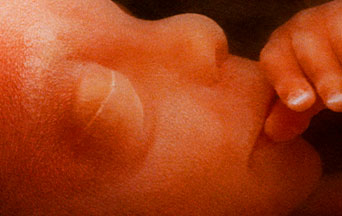
The mother-child relationship is intimate and emotional. The mother gives everything to the baby that develops in her womb in an act of love. Such touching solicitude and sacrifice explain the universal appreciation of motherhood. It might also explain the antipathy of the left, which hates all links of dependency and sees pregnancy as a restriction upon a woman’s freedom.
However, the bond is not only about sacrifice. As science explores the mystery of motherhood, researchers are making some marvelous discoveries. For example, the mother/child relationship is not a one-way giving of the mother. The link does not end at birth. There are times when the child marvelously repays the mother for her sacrifice.
Each discovery makes it ever more evident that the child is a separate and individual being, independent of the mother yet fabulously connected. Incredibly, this highly emotional and spiritual relationship is reflected in the biological workings of the bond.
The Baby and the Mother Exchange Cells
Indeed, the baby’s cells are different from those of the mother from conception onward. However, since the mother is constantly nourishing and helping the baby’s development, her cells find their way into the child’s body.
Scientists now say that the baby’s cells find their way into the mother’s body and stay there. As much as 6 percent of the free-floating DNA in the pregnant mother can come from the baby, which diminishes over time.
The process of exchange and circulation of cells is called microchimerism. Thus, the child’s physical presence in the mother continues well after birth. The baby’s cells leave a permanent imprint in the mother’s tissues, blood, bones, brain and skin—where they can remain for decades. This presence includes all the mother’s children, even in cases of second-term miscarriage or abortion.
 Learn All About the Prophecies of Our Lady of Good Success About Our Times
Learn All About the Prophecies of Our Lady of Good Success About Our Times
These cells are often stem cells with amazing regenerative and reproductive powers. A fascinating article in Scientific American claims that a “constant conversation” goes on between the cells. After birth, scientists increasingly believe that this genetic matter may influence the mother’s health for many years.
Baby to the Rescue
Studies of these microchimeric conversations are still in the early phases of analysis. However, mounting evidence shows a touching consideration on the part of these fetal cells. During pregnancy, some maternal illnesses will vanish because these fetal stem cells will rush to the scene of injury and mend the mother’s damaged organ or heart.
Thus, the mother protects the baby from outside danger while the baby’s stem cells detect internal hazards and rebuild the mother for safe delivery.
Natural Maternal Health Care
After birth, the baby’s cells continue their work, which diminishes over time. Some researchers believe that fetal stem cells reduce the risk of breast and other cancers. The cells seem to fight against autoimmune disorders like rheumatoid arthritis. They have been found to help mothers with thyroid and liver damage by morphing into organ cells. The mother’s heart might be the object of the cells’ repair missions.
The number of children does not seem to affect the regenerative power of the fetal cells. The important factor was the date of the last birth. The length of the pregnancy must be at least 20 weeks to have an effect. The regenerative power of the cells dwindles with time, and they reproduce less.
An Anti-Feminist Conclusion
The findings are marvelous yet not surprising. This mutual assistance is consistent with how God created things with purpose. The love and life-giving sacrifice of motherhood would have to find reciprocation in nature. It would only be natural that a physical link complements the moral link and even that it diminishes as the child advances toward less dependency in adulthood.
Science Confirms: Angels Took the House of Our Lady of Nazareth to Loreto
This relationship points to the tragedy of abortion, which can destroy the moral and mental well-being of the mother and deprive her of physical benefits as well.
Feminists claim that pregnancy jeopardizes a mother’s health. On the contrary, childbearing contributes to the mother’s health. Both mother and child benefit physically, psychologically and spiritually. Children are a blessing to the mother’s well-being in all respects, not a curse to her freedom. Feminists would do well to follow the science and embrace childbearing.
Photo Credit: © mrallen – stock.adobe.com

